Australia has become one of China' s major partners in terms of training and development of talents and scientific innovation, China's Vice Minister of Education Du Yubo told Xinhua in a recent interview, adding that the two countries will continue to build a stronger relationship in education corporation.
 |
|
The fourth China-Australia education joint work group meeting was held in Canberra on May 23, 2011. |
The fourth China-Australia education joint work group meeting was held in Canberra on Monday. The meeting was jointly-chaired by Du and Robert Griew, the Australian Associate Secretary for Tertiary Education, Skills, Jobs and Workplace Relations. Xinhua reporters conducted an exclusive interview with Du after the conclusion of the meeting.
Du stressed the needs to constantly enrich the content of educational exchange, to enhance the level of educational cooperation, and to make greater efforts to deepen cultural exchanges between the two countries.
"Although the two countries differ in culture, value and characteristics, we face the same challenges in education development," Du told Xinhua.
"Being open, tolerant, cooperative and complementing to each other should be our choice."
"I believe we can infuse Australia-China education cooperation with new stimulus, thereby contributing to the two countries' cultural exchange."
During Monday's meeting, China and Australia signed a "Jointly Work Plan" to determine the priority areas of educational cooperation in the next two years.
Du said the contents of the future corporation plan is very sufficient, which includes issues regarding higher education, vocational education, Chinese language teaching and student exchange.
In the aspect of higher education, Du said China and Australia both agreed to continue exchanging information on higher education reform. China and Australia will also encourage top universities of both countries to further their corporations.
In student exchange, Du said both countries agree they should develop a safety handbook for Chinese students in Australia, while China will also explore effective ways to increase the number of Australian students in China.
In aspect if promoting Chinese language teaching, Du said Australia will try to promote Chinese teaching in primary and secondary schools. At the same time, China will continue to support the building of Confucius Institutes and classes in Australia and will find ways to raise the number of qualified institutions for learning Chinese.
"I have briefly introduced three areas of the plan with examples. Some contents are really specific," he said.
"The next two years will be our base for cooperation and policy implementation."
Meanwhile, Du praised Australia's efforts in trying to perfect its policies and laws to secure Chinese students' interest and rights, building a stable environment for studying and living.
At the same time, he also reminded Chinese students to be prudent about studying overseas and choose institutions of quality. He urged Chinese students to abide by laws in the countries where they study and learn how to protect themselves in foreign countries.
Du expressed broad prospects on the future of the development between the two countries, saying that he firmly believes Australia and China can complement each other, and both have great potentials to cooperate in the education field.
(Xinhua News Agency May 27, 2011)